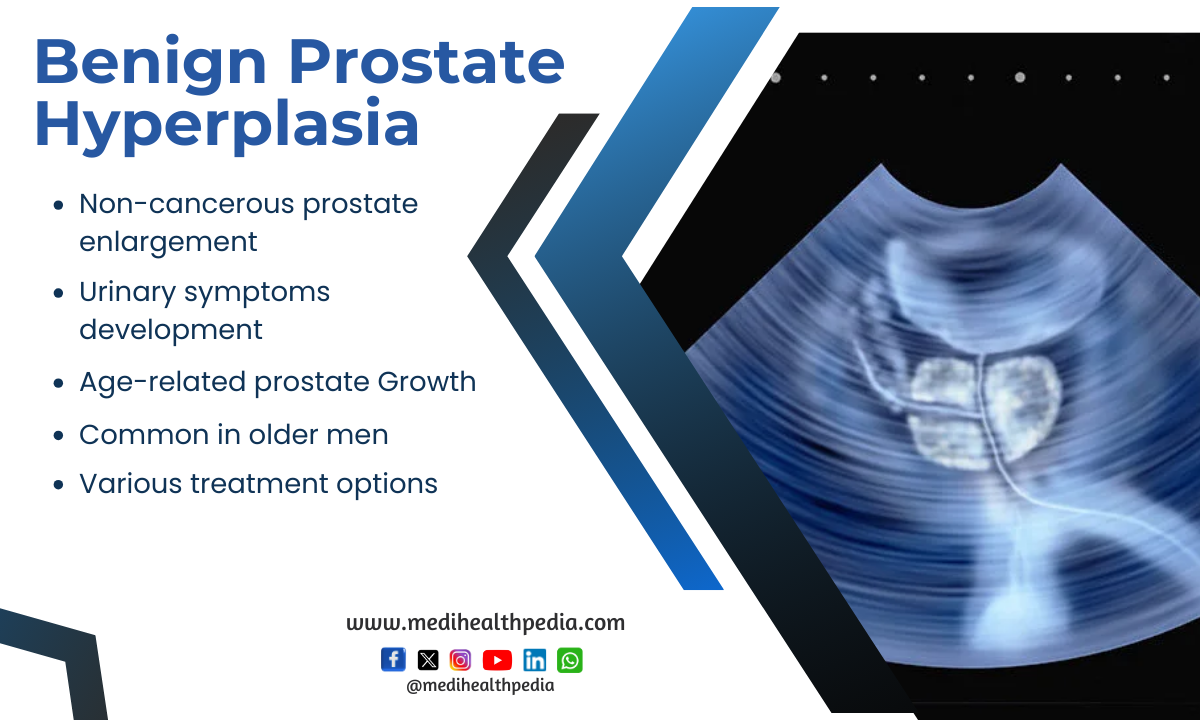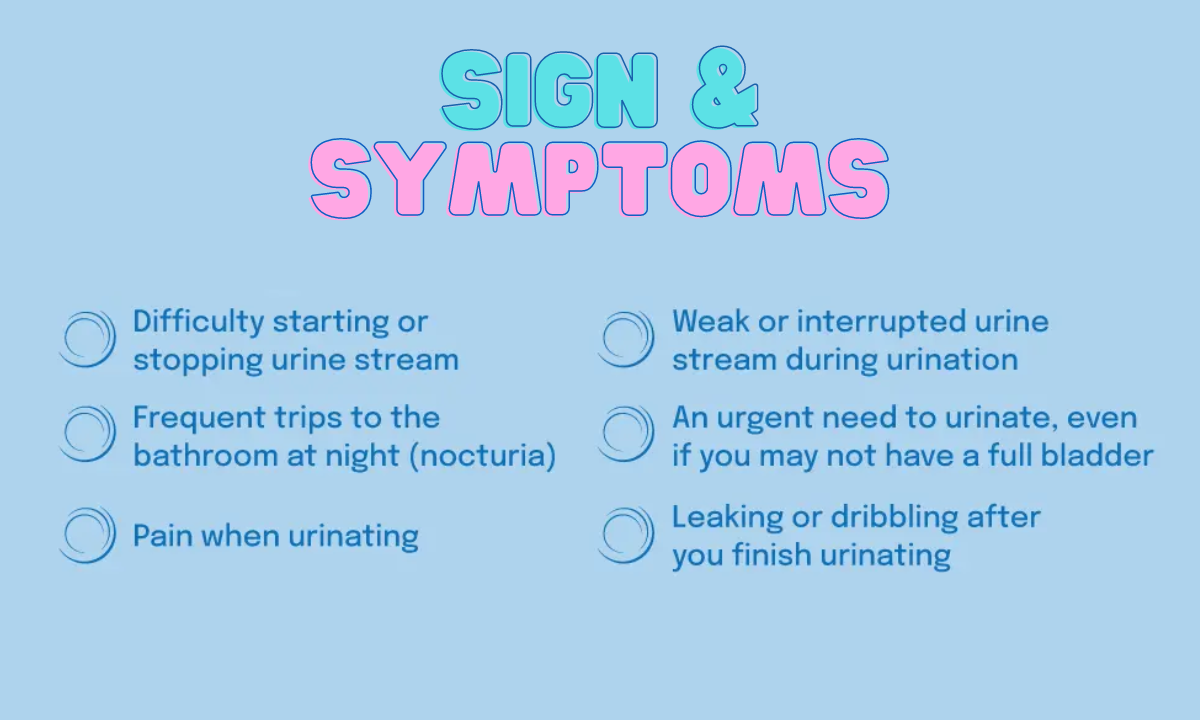Understanding Benign Prostatic Hyperplasia (BPH) Symptoms and Herbal Treatment Options
Introduction
Benign Prostatic Hyperplasia (BPH) is a common condition among aging men characterized by the non-cancerous enlargement of the prostate gland. This article aims to provide a detailed overview of BPH, covering its clinical overview, presentation, investigations, complications, conventional treatment, prevention strategies, herbal remedies, lifestyle modifications, and a concluding summary.

Clinical Overview
Benign Prostatic Hyperplasia (BPH) occurs when the prostate gland, situated beneath the bladder and surrounding the urethra, enlarges gradually over time. This enlargement can lead to compression of the urethra, causing urinary symptoms such as frequency, urgency, weak urinary stream, nocturia, and incomplete emptying of the bladder.
Clinical Presentation
The clinical presentation of Benign Prostatic Hyperplasia (BPH) typically involves urinary symptoms, which can vary in severity among individuals. Common symptoms include increased frequency of urination, especially at night (nocturia), urgency to urinate, weak urinary stream, difficulty starting or maintaining urination, dribbling after urination, and a feeling of incomplete emptying of the bladder. In severe cases, BPH can lead to urinary retention, urinary tract infections, bladder stones, and kidney damage.

Basic Investigations
Diagnosing Benign Prostatic Hyperplasia involves a thorough medical history, physical examination, and diagnostic tests. Basic investigations include:
- Digital Rectal Examination (DRE): To assess the size and consistency of the prostate gland.
- Prostate-Specific Antigen (PSA) Test: To measure the level of PSA in the blood, which may be elevated in BPH and prostate cancer.
- Urinalysis: To rule out urinary tract infections or other urinary abnormalities.
- Uroflowmetry: To assess the flow rate of urine during urination.
- Transrectal Ultrasound (TRUS): To visualize the prostate gland and assess its size and structure.
These investigations help confirm the diagnosis of BPH and rule out other potential causes of urinary symptoms.
Complications
If left untreated, BPH can lead to various complications, including acute urinary retention, urinary tract infections, bladder stones, chronic kidney disease, and bladder damage. It can significantly impact an individual’s quality of life, causing discomfort, inconvenience, and psychological distress.
Conventional Treatment
The treatment of Benign Prostatic Hyperplasia (BPH) aims to alleviate urinary symptoms, improve urinary flow, and prevent complications. Conventional treatment options include:
- Alpha-Blockers: Medications such as tamsulosin or terazosin relax the muscles of the prostate and bladder neck, improving urinary flow and reducing symptoms.
- 5-Alpha Reductase Inhibitors: Drugs like finasteride or dutasteride reduce the size of the prostate gland by inhibiting the conversion of testosterone to dihydrotestosterone (DHT), thus relieving symptoms and preventing disease progression.
- Combination Therapy: Some individuals may benefit from a combination of alpha-blockers and 5-alpha reductase inhibitors for more significant symptom relief.
- Minimally Invasive Procedures: For individuals with moderate to severe symptoms, minimally invasive procedures such as transurethral resection of the prostate (TURP), laser therapy, or prostate artery embolization (PAE) may be recommended to remove or shrink excess prostate tissue.
- Surgery: In cases of severe BPH or when other treatments are ineffective, surgical procedures such as open prostatectomy or robotic-assisted prostatectomy may be necessary to remove enlarged prostate tissue and improve urinary flow.
Prevention
While some risk factors for Benign Prostatic Hyperplasia (BPH), such as age and family history, cannot be modified, several preventive measures can help reduce the risk of developing symptomatic BPH. Key prevention strategies include:
- Maintain a Healthy Lifestyle: Eating a balanced diet, exercising regularly, maintaining a healthy weight, and avoiding excessive alcohol consumption may help reduce the risk of BPH.
- Stay Active: Engage in regular physical activity to promote overall health and reduce the risk of urinary symptoms associated with BPH.
- Manage Chronic Conditions: Control chronic conditions such as diabetes and hypertension, as uncontrolled comorbidities may exacerbate urinary symptoms.
- Regular Health Check-ups: Regular medical check-ups allow for early detection and management of BPH and other urological conditions.
Herbal Medicines
Several herbal remedies have been studied for their potential efficacy in managing Benign Prostatic Hyperplasia (BPH) symptoms. Some commonly used herbal medicines include:
- Saw Palmetto: Extracts of the saw palmetto plant have been shown to improve urinary symptoms and flow rates in men with BPH.
- Pygeum Africanum: Derived from the bark of the African plum tree, pygeum extract may help reduce urinary symptoms and improve quality of life in men with BPH.
- Beta-Sitosterol: A plant sterol found in certain fruits, vegetables, nuts, and seeds, beta-sitosterol supplements have been studied for their potential to relieve urinary symptoms associated with BPH.
While herbal medicines may offer symptomatic relief for some individuals, more research is needed to confirm their efficacy and safety in managing BPH.
Lifestyle Modifications
In addition to medical treatment and herbal remedies, lifestyle modifications can help alleviate Benign Prostatic Hyperplasia (BPH) symptoms and improve overall urinary health. Lifestyle changes may include:
- Limiting Fluid Intake Before Bed: Limiting fluids, especially caffeine and alcohol, in the evening may help reduce nocturia and improve sleep quality.
- Bladder Training: Practicing bladder training techniques, such as scheduled voiding and delaying urination, may help improve bladder control and reduce urinary urgency.
- Kegel Exercises: Strengthening pelvic floor muscles through Kegel exercises may help improve bladder control and urinary symptoms.
- Dietary Changes: Avoiding spicy foods, caffeine, and alcohol, which can irritate the bladder, and increasing fiber intake to prevent constipation may help alleviate BPH symptoms.
- Stress Reduction: Stress management techniques such as relaxation exercises, meditation, and deep breathing may help reduce urinary symptoms associated with stress.
Conclusion
Benign Prostatic Hyperplasia is a common condition affecting aging men, characterized by the non-cancerous enlargement of the prostate gland. While BPH can cause urinary symptoms that significantly impact quality of life, effective treatments and preventive measures are available to manage the condition. By understanding the clinical overview, presentation, investigations, complications, conventional treatment options, prevention strategies, herbal remedies, and lifestyle modifications discussed in this article, individuals can take proactive steps to address BPH and improve their urinary health and overall well-being.

